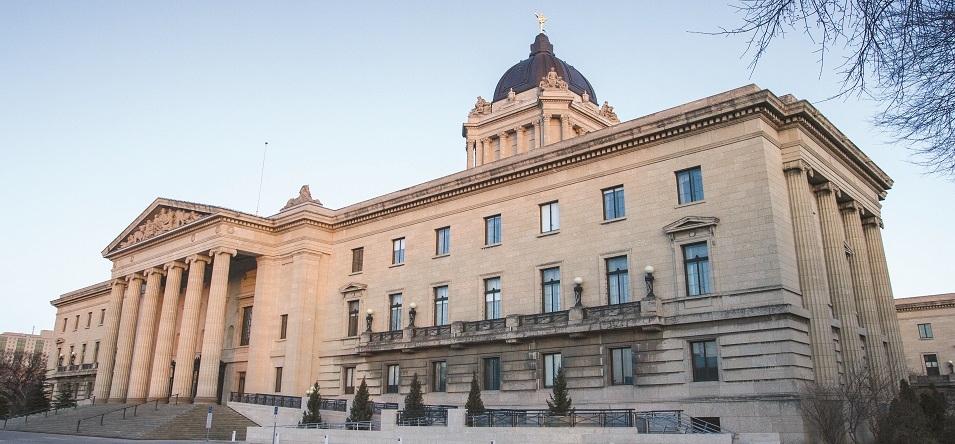
On March 16, the day that the provincial election was called, the temperature in southern Manitoba creeped up to a comfortable four degrees. Just two days earlier, it hit a record-breaking fourteen degrees. Flash back two years, to late January 2014, and Shannon Martin was busily canvassing the wide geographical area that is the Morris constituency in record-breaking cold.
“I was just joking with my sign guy,” Martin says over a drink at Hespeler’s Cookhouse and Tavern in Niverville. “As we’re putting a sign up in someone’s yard, I said, ‘You know what? It sure beats the minus forty when we put up a sign here last time.’ There were times during the by-election when I literally—I live in La Salle—I literally could not leave my neighbourhood, because of the drifts. Like, nobody could get through… So this is heaven!”
Martin won that by-election, resoundingly, with 70 percent of the vote. Those sorts of big wins have been common in Morris, which has been solidly Progressive Conservative all the way back to 1954.
Like Martin himself, Niverville is a relative newcomer to Morris politics, having been redistricted just prior to the 2011 provincial election. Niverville is now the largest community in the riding, with La Salle and Headingly running second and third respectively.
“Unfortunately it’s those outlying communities of any riding that find themselves moved around,” Martin says. “And because Niverville is the largest community, then it’s easier to move them around and give the new riding a population boost.”
From Niverville in the east, Elie in the west, and the town of Morris in the south, Martin has a lot of ground to cover. In the two years since first taking office, Martin says he has made it a priority to attend every town and RM council meeting at least once.
“I think it’s important to know who the other elected officials are, because they play a very important role,” he says. “You want to build those relationships. I think I’ve done, in my opinion, a good job of getting out and about in the communities.”
Martin sees similar challenges playing out in many areas of southern Manitoba, particularly in the communities he represents. Whether it’s Niverville, La Salle, Headingly, or Oak Bluff, the biggest challenge is growth.
“They’re all doing very well. I mean, new homes are going up. But with that population comes other challenges in terms of infrastructure, and more than just pipes and pavement. We’re talking about new schools, new recreation facilities, and all those things that come from a growing population. I’ve always said, though, that these are good problems to have.”
Niverville has seen its share of population-related stresses. The high school, for example, has seven huts. The elementary school is in the process of building an additional five classrooms just to accommodate the grades it already has.
“There’s overcrowding all over,” Martin acknowledges. “Headingly needs a new school. My kids are ten, eight, and six. They go to the La Salle school, and they’re on their fifth hut now. There’s plans in the works for another six huts. I mean, we’re bursting.”
According to Randy Dueck, superintendent of the Hanover School Division, the current provincial government is hesitant about approving capital expenditures like new schools until the population already exists to fill them. This often leads to inadequate facilities during growth periods.
Martin says this is somewhat counterintuitive. “The frustrating part is that this population growth didn’t happen overnight,” he points out. “You didn’t wake up in Niverville and say, ‘Ooh, there’s 500 more kids here.’ I mean, one thing governments do is they collect data, so these things shouldn’t come as a big surprise… I guess part of the issue is that predictions can go wrong. But these are not predictions. They’re projections. There’s a difference.”
In the last couple weeks, the various party leaders have been campaigning on key policy points. Progressive Conservatives leader Brian Pallister has pledged to roll back the PST to seven percent in their mandate.
“This affects not just individuals but businesses and municipalities,” Martin says. “It affects hospitals and schools, too, because they’re all paying PST. And so everyone benefits by the rollback.”
However, Martin thinks the raising of the PST two years ago is a symptom of much larger problems. “Manitobans are among the highest taxed in Canada. That’s the data. Open up the government’s own budgets and you’ll see that… Under the NDP, in their last term, they doubled the size of Manitoba’s debt. You’re talking about the debt being up to 32 billion dollars, which is a phenomenal amount of money.”
For this reason, according to Martin, Pallister has wisely made it clear that the PCs won’t be making many grandiose spending promises until they get a chance to see the financial books and determine how deep in the hole the government is.
As Martin heads into the final weeks of the campaign, he says he will focus on forging relationships and knocking on as many doors as possible.
“I’ve been afforded such a unique privilege to sit as an MLA. It’s a wonderful, wonderful experience,” he says. “And knock on wood, I’m hoping that I can enjoy it for a little bit longer.”



















